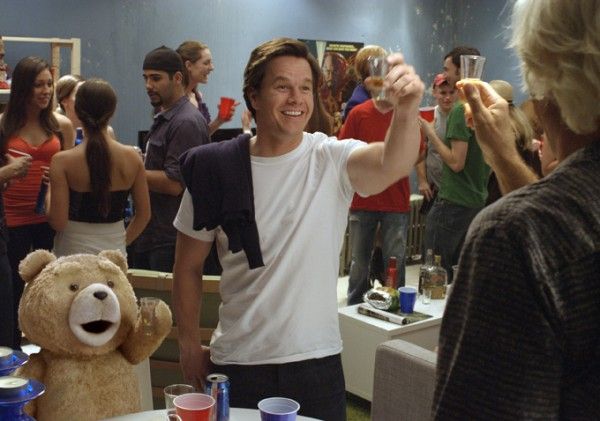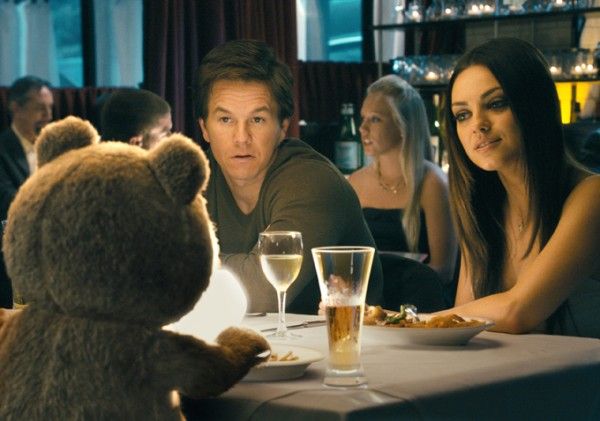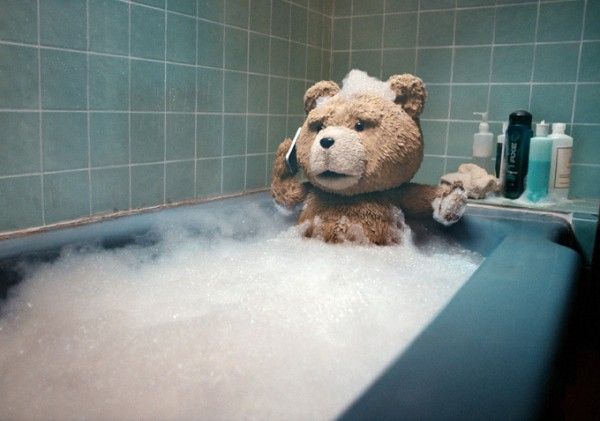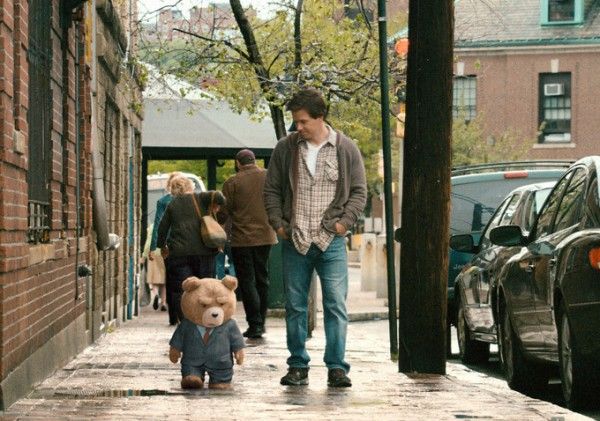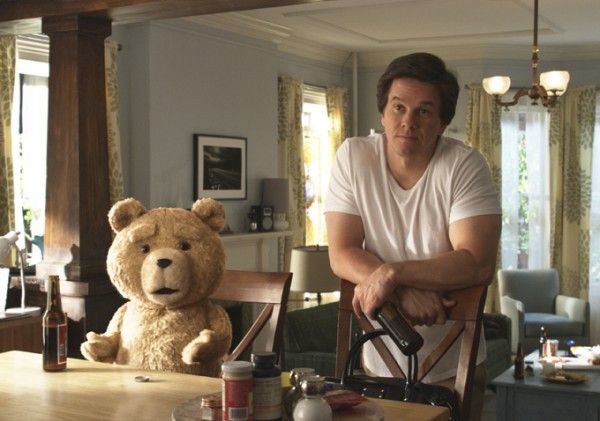Ted is a raunchy, outrageous and hilariously funny live-action/CG-animated comedy from the zany mind of Seth MacFarlane, the man behind the animated TV show Family Guy. Bringing his boundary-pushing brand of humor to the big screen for the first time as writer, director, producer and voice star of the bear itself, the story is centered around John Bennett (Mark Wahlberg), a grown man whose childhood wish brought his cherished teddy bear to life. Almost 30 years later, Ted is still by John’s side, to the increasing annoyance of his girlfriend, Lori (Mila Kunis), who issues an ultimatum for John to leave his boyhood friend behind and enter adulthood. For more on the film, here's four clips.
At the film’s press day, co-stars Mark Wahlberg and Mila Kunis, along with Seth MacFarlane, talked about how this film came about, starring opposite a teddy bear, how smooth the special effects turned out to be, figuring out where to draw the line with offensive humor, how Sam Jones (Flash Gordon) ended up in the film, and deciding on the specific look for Ted. Check out what they had to say after the jump.
Question: Seth, what took so long for you to make a movie?
SETH MacFARLANE: Family Guy had that little cancellation thing happen to it, and I wanted to make sure that it was fully on its feet, after coming back, before I stepped away to do a film because it did mean stepping away from the show completely for at least a year, and that was something that I hadn’t done yet. This was an idea that had actually been floating around in my head for a while. I had originally conceived it as an animated series idea and, for a number of reasons, shelved it. And then, when it came time to do my first movie, it seemed like a story that would make a much better film than a series.
Mark and Mila, when you initially signed on, were you worried about co-starring opposite a bear? Did you wonder whether it would work, in terms of looking at the eye-line and the stuff you’d have to do with him?
MARK WAHLBERG: I was a little nervous at first, but once we started getting into it, I felt comfortable pretty quickly. It was more of a problem working with Mila. She’s a tough cookie.
MILA KUNIS: You know what? It actually wasn’t so bad. I didn’t have very much physical interaction with the bear. Mine was very circumstantial, whether the bear was to the right of me or to the left of me or to the front of me. I think Mark had it the hardest. For me, it wasn’t so frightening. You have a stick and two eyes. As far as the animation or the look of the bear, I was never too concerned with that. There’s not a question of why MacFarlane can do that, and do it incredibly well.
WAHLBERG: They had done a test, too. We got to see a little bit of the bear, before we started shooting. There was a concern of whether it would go into the scene seamlessly with the chemistry, even though Seth and I were having a great time acting opposite each other, and whether it would translate when you’re putting the bear into the actual scene.
Seth, did the special effects turn out to be more of a pain in the ass than you expected?
MacFARLANE: No, the special effects were surprisingly a smooth part of the process. We tried a fairly new technique of doing it all live on set, to get an improvisational feel, but it went surprisingly smooth. We had two great studios – Tippett and Iloura – that just knocked it out of the park for us.
Did you re-write a lot of Ted’s dialogue in post?
MacFARLANE: Yeah, we had a little bit of liberty to do new Ted lines in post, in case something didn’t work. That was a luxury that we took advantage of. We would screen the movie and, if something didn’t work, we’d try a different line at the next screening. That’s one of the good things about an animated character.
The movie has a lot for college audiences. What do you want them to take away from this film?
WAHLBERG: Well, go back and smoke another joint and see it again. It’s always better the second time around. You were so wasted the first time, you probably missed some jokes.
MacFARLANE:Â That answer works for me, too.
KUNIS:Â Me, too.
Mark, your comic timing is just so impeccable. Who were comic idols, growing up?
WAHLBERG: I don’t know. I just grew up watching a lot of old television with my father, like F Troop and Barney Miller. [Det. Stan “Wojoâ€] Wojciehowicz would probably be the one to best describe one of my comic idols. Does anybody know who Wojciehowicz was? I just grew up watching TV. It’s all in the material. I approach a comedy the same way I do a drama. I try to make it as real as possible. Thankfully, Seth was into that. I was worried that maybe he’d want me to do a couple prat falls, and that’s not really my thing.
Seth, you’re used to a TV-14 constraint on Family Guy, but for this, you knew it would be rated R. Did you find yourself pulling back while having freedom to do more?
MacFARLANE: Yeah. You’re not dealing with the restrictions imposed by the FCC.  They’re self-imposed. In a way, that does make it harder. You actually have to think about it, as opposed to just taking for granted that you’re not going to be able to do this. With a movie like this, most of it was language. This movie’s been labeled hard R, but I don’t think of it as a hard R movie. It’s a fairly moderately R movie. There’s no graphic sex and there’s no heavy drug use. It’s R for language. So, if that doesn’t bother you, you’re fine. The first cut of this movie had a lot more uses of the word “fuck,†and we did cut that down somewhat because we found that, even though it’s an R-rated comedy and you can do whatever you want, it was starting to eat into the sweetness of the story a little bit. So, you do have to impose restraints on yourself, and it is more difficult than just being told by someone that you can’t do something.
You do a brilliant job of showing the clash between youth and adulthood in both this and the TV show. Why is that so prevalent for you?
MacFARLANE: Adults acting like children and children acting like adults is generally a pretty reliable comic device. On Family Guy, you have Stewie, who is a baby that acts like an adult and Peter who’s a man that acts like a child. This movie is a bit more textured and has a lot more shades to it, but in terms of the dynamic, we’re essentially playing the teddy bear as the physical manifestation – in a symbolic or literal way – of John’s inability to grow up and get on with his life.
How difficult was it to prepare for the hotel room fight with Ted?
WAHLBERG: Well, I didn’t have to do anything to prepare other than just trust Seth. I just felt so ridiculous flopping around in that room, by myself. But, everybody loves that scene.
MacFARLANE: The whole joke of it was that we wanted to play it as realistically as possible. We wanted it to feel like a fist fight in The Bourne Identity, except one of the characters happens to be a teddy bear. I think we pulled that off. Mark just sold it, 150%. Even without the bear in there, when you look at that raw footage with the sound effects and him getting the shit kicked out of him by this invisible adversary, it actually still kind of works. Hopefully, we made it painfully realistic.
Mark and Mila, what do you think is unique or special about Seth MacFarlane’s humor, both in his animated series and this movie?
KUNIS: I’ve done so many interviews about Seth that it’s kind of redundant for me to say this, but over the years, from Family Guy to Ted, I think that Seth’s humor is incredibly socially relevant. It’s not humor for the sake of being humorous. And I think that there’s a certain linear story to his humor. It’s very consistent and it’s smart. It doesn’t make you feel dumb. I’ve always said that he’s brilliant at what he does because he sets people up in low-brow situations with high-brow humor, and that’s one of the hardest things to do. Also, all of his humor is rooted in truth and honesty. From Family Guy’s flashbacks to the songs that some of the characters break into to the fact that there’s a movie coming out about a talking teddy bear that nobody seems to be questioning, it’s all rooted in truth. It’s very grounded humor. Nowadays, it’s very rare to get that.
WAHLBERG: That was good. I was just going to say that he’s the funniest motherfucker I’ve ever met.
KUNIS: I could have said that, too. Fuck! I’ve only known him for 13 years.
Seth, when it comes to some of the more offensive humor, how do you figure out where to draw the line?
MacFARLANE: In a movie like this, we adhere to the same rule that we generally do with the animated show, which is, if you’re going to make fun of one group, you’ve gotta make fun of them all. The cliche is “equal opportunity offender.â€Â In this movie, pretty much every religion, race and creed is poked fun at. I think that, if you’re going to make fun of one group of people, you’ve gotta go all across the board. As far as something going across the line, the systems that are in place, as far as the screenings and audience testing, make it pretty clear what’s over the line and what’s not. If something gets a gasp, eight times in a row, at eight screenings, you know it’s probably got to go. There’s been a couple of those jokes. Even on Family Guy, we do screenings of each episode before it goes to full animation and our own staff is not shy about going, “No, no, no, that’s way over the line!â€Â If you’re getting enough laughs on the way there, it’s probably okay. If even your friends are telling you that it’s offensive, then they’re probably right.
How many gasps did you get when you were testing Ted?
MacFARLANE: There was only one that I can think of, that I won’t repeat here because it didn’t work. For the most part, by the time it got to the test screenings, we had excised most of that material. There was one that we pulled out because the audiences just thought it was too over the line.
Seth, why do you love Sam Jones so much, and why do you hate Brandon Routh?
MacFARLANE: I don’t hate Brandon Routh. The jokes at the end of the movie are probably the closest things to what people may expect from me because of shows like Family Guy. It’s a satirical jab. I’m sure he’s a very, very nice guy. The Flash Gordon idea was just because it’s a cult movie that a lot of people know. It’s ridiculous and absurd, and it seemed like a funny piece of pop culture for John and Ted to bond over. It was something that worked as their movie that was the symbol of their friendship. We just looked up Sam Jones and asked if he wanted to come do it, and he was very enthusiastic.
In this film, you can really understand why Lori wants Ted to move out and John to grow up. Was that intentional, so that you didn’t make her into the bitchy girlfriend?
MacFARLANE: Nine times out of 10, in a movie like this, you do see the image of the hands on the hips and the, “Stop this nasty behavior!,†tone. That’s one of the reasons we wanted Mila for this. We tried to make sure it wasn’t that on the page, but even where we missed spots, Mila was there to very shrewdly, with laser-light precision, make sure that did not happen. The character has a very valid point. She had the hardest job in the movie, but in a lot of ways, it’s the character with the most realistic goal. She has this guy who’s very childish and she likes those things about him. She likes the fact that he’s not perfect. She likes the challenge of maybe having to fix this guy, a little bit. But, at the same time, in the higher part of her brain, she wants the stability and she wants the responsible boyfriend who’s going to step up. I hope that’s very relatable. I think her beef with him is legit, in the movie.
KUNIS: Yeah, everything that Seth said is correct. It was a hard thing to do because you want to play the fine line of not having to be too cool ‘cause then that’s not realistic, but you don’t want to be the nagging girl in the film because then you’re stuck being the nagging girl in the film. Seth was very responsive to anytime that there was an argument that I had, regarding the character’s dialogue, when the response wasn’t justified. In all honesty, we had many discussions on set over it, and it was always because I was like, “This is coming across too bitchy. It’s not how a woman would react.â€Â More times than not, he was like, “Okay, how do you propose we fix the problem?â€Â It was awesome because it allowed me to help make the character be what I wanted her to be, but with Seth MacFarlane’s voice. It was very collaborative, and he was very open-minded to the idea. It’s a hard character to write, especially for a man. I wouldn’t even know where to begin, and I’m a female. You’re damned if you do and you’re damned if you don’t. You’re stuck in this weird limbo.
Mila, how do you stay grounded and what makes you happy in life?
KUNIS: I don’t know. I guess I’m very honest and I speak my mind, at all times. I think that, if anything, helps me stay grounded because I will say what I think, but I don’t expect the yes, in return. If you ask a question, there’s always two answers, a yes and a no. You’re not always right. I will fight to prove that I’m right, but I will accept being wrong. I have an amazing family. I have a truly incredible group of friends that I can count on one hand. I’m so blessed and lucky to be in a position to work with people that I respect and look up to and admire, and actually want to show up to work with. I think a lot of that speaks for itself. I am able to do the job that I love and surround myself with the people that I like to go to work with and work for, for 17 hours a day, and people whose opinion I trust and whose outlook I respect. I don’t really know how to answer that question because I’m sure many people would disagree and tell you that I’m a horrible human being. But, I do believe that it all depends on who you surround yourself with. What you put out is what you get back in return. I work hard. I work my ass off, and I’ve worked that way for 20 years. But, me working hard, I don’t have to show you how hard I work. As long as I know how hard I work, that’s all that matters. I think people get so caught up in trying to prove to everybody else how hard they work that they lose all sense of what they do and why they do it. As long as I do my homework and I know I did, and I show up and do my job, at the end of the day, that’s all that matters. And then, I can have a life.
Mila, is comedy your favorite genre to act in, or are you interested in other genres as well?
KUNIS: Somebody was like, “After Black Swan, we didn’t really expect you to follow this up with Ted?,†and I literally went, “Why, because it’s funny? Does being funny somehow take away from the quality?â€Â It doesn’t. I’ve had this argument with MacFarlane many times, but I don’t think I’m funny. I really don’t.
MacFARLANE:Â I disagree.
KUNIS: Thanks, but I don’t. That doesn’t mean that I don’t love comedy, but I would never be able to go on a stage and do a roast. I think I would panic! That being said, I love comedy when it’s written well. When someone like Seth MacFarlane gives me dialogue to say that I think is brilliant, I will say the shit out of it and I will make it work to my best ability. But, I will not go and do something that I don’t believe in, whether that be comedy, horror, sci-fi, action or whatever genre. It doesn’t matter. It’s about quality. If I love Ted and I think that’s a good movie, I don’t care if it’s funny or sad, as long as it’s good. It’s just entertainment. So, I will go in whatever direction I’m drawn to. After Ted, I went and did Oz: The Great and Powerful. I am dying to know what genre people are going to put that movie in. And then, after that one, I went and did Hell & Back, which is a stop-motion animation, R-rated movie. And then, I went and did Blood Ties, which is a cop drama. None of this makes sense. If you look at my movies, they all look like a crazy person chose them, who’s erratic and has no lineage whatsoever, but I choose the work that I believe in.
MacFARLANE: You bring in A-list actors to an animated show and it separates the men from the boys. Instantly, you see who is a pretty face and who actually has the chops. We’ve had plenty of A-list people who have come in and we’ve seen the Emperor’s clothes. For all these years, we’ve thrown a lot of very, very subtle comedy at Mila, for the role of Meg, and you’re not seeing her lovely face, you’re hearing her voice. All you’re getting is her ability, and it’s tremendous. That, to me, is the best example of all. You are hearing her voice and you are hearing her skill of her comedic timing, and she’s getting laughs and has been for 10 years. That’s worth noting.
This film is very influenced by Boston. How did that come about?
WAHLBERG: The movie was already written to take place in Boston. I don’t know if Seth even trusted that I could do a Boston accent. Nobody was really doing the accents. Everything that has to do with the movie in Boston is Seth. It was already on the page.
MacFARLANE: The comparison I always make is to Ghostbusters, as weird as that is. To me, one of the reasons that movie worked was that you had this ridiculous fantastical element to the story, but it was set against, not just a realistic city, but a city we all know. There were ghosts running around and these exterminators who had to eliminate them, but New York is the very familiar and very real New York, with all of its warts, that we know. It grounded everything and earned you the rest of the stuff. That was kind of what I wanted this movie to feel like. You have a talking bear, so the rest of the movie should be as real and grounded as possible to earn that. One of the things that you can accomplish that with is by setting it in an actual city with an actual regional flavor.
Mark, what made you decide to do a supplement line with GNC?
WAHLBERG: I’ve always wanted to be in the health and wellness business. I try to encourage people to live a healthy lifestyle. If you want to smoke pot and drink beers, do it on the weekend. During the week, eat healthy and exercise.
Seth, can you talk about the choices in the music and how much it adds to the humor of the story?
MacFARLANE: With the music, they’re song choices that fit with the movie. I’m a film score junkie. I’m the world’s biggest John Williams fan. I wanted this movie to have a classic film score because I felt like what it would do was play against the edginess of the comedy and earn you some of the harder jokes. You have to have that to balance things out. With Family Guy, for years, that’s what we’ve done. We’ve got these hard-edged jokes, but we have a pretty serious musical style. I think it works in tandem with each other.
Did Ted always look like Ted, or was there a process for deciding how Ted would look?
MacFARLANE: I wanted to keep the bear’s design very simple. There’s a style of 2D animation that The Simpsons employs and that Family Guy employs. When Homer Simpson is being addressed and he’s just sitting there listening, it’s just a blank, wide-eyed stare.  There’s something 100 times funnier about that, then if there were a series of Disney-esque, subtle reactions. Each audience member can imprint what they think is going on inside his head, based on their own bullshit, and I wanted to do the same thing with Ted. Oftentimes, CG characters are so humanlike that they come off kind of creepy looking. Have you ever seen Jack Frost, that movie with Michael Keaton, with that terrifying snowman that just gave you nightmares? That would be an example of CG gone wrong, and they all acknowledged it, after that movie. I wanted to keep Ted simple. His eyes are very blank. There’s a little expressiveness with the eyebrows, but it’s a pretty simple design and that was deliberate. I wanted to leave enough to the imagination that what that expression is or what that thought process is would be maybe a little different for each audience member.
For more on Ted, here's all our previous coverage.

